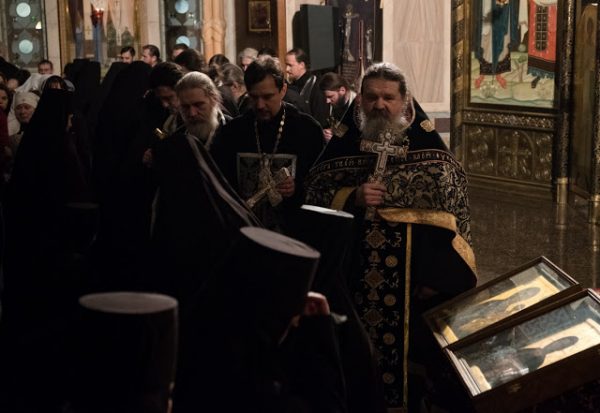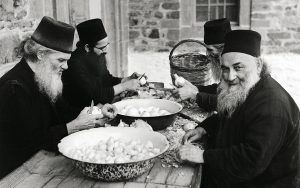May I listen to music during the Great Lent? What kind of music is suitable for this season?
There is hardly any uniformity in approaches to this issue. Every person has his own measure because music plays different roles in the lives of various people.
There is music designed solely for entertainment. It makes one cheerful or elated. It is intended to evoke certain feelings or emotions. You should keep away from this kind of music. The Great Lent is the time when an individual must not be distracted or diverted. On the contrary, he must become more focused and concentrated on his life, his relationships with God and his neighbour. So if music serves to entertain, distract, or deafen out serious contemplation, it won’t be right. There is music that helps one to feel empathy and other good emotions. It helps a person to concentrate and leads to compassion. This kind of music is acceptable. Again, the Great Lent is the time when we can remain silent to try and hear God’s voice inside our hearts.
You should look inside your heart and say what impact this or that music really has on your mood. Does it help you? Does it make you closer to God? Does it bring anything positive into your life: something you need to survive and not to be depressed when struggling with the sin, or is it just a way to have fun and to fill in the empty spaces in your life? Look at its effects: do you gain or lose anything? Do you get closer to God or remain barren? That’s what has to be your primary touchstone.
You’ve got to weigh in all the outcomes of your actions. For instance, if it is the Holy Week, and you listen to music. Let all human flesh be silent — therefore, we ought to keep silent. Elder Silouan used to say that one should fast to such an extent so as to be able to pray after the meal: that’s how he could identify the proper measure of food. One person can be in mood for prayer even if he eats a lot, while another person can’t. That’s why it depends on whether you are addicted to music or not. If music is your passion, then you should abstain from it during the Great Lent. You ought to seek the balance you need to remain vigilant and wakeful.
As far as church music is concerned, it is even beneficial. Lenten chants are prayerful and lead us to repentance. It is only natural that we have Lenten concerts where people listen to church music, which is sung in churches during the Great Lent. It is really helpful for the souls that cannot get away from the vanity of this world. I think we should use it.
I heard an opinion that one can even eat meat during Lent due to one’s illness or out of love towards one’s neighbour. Is it correct?
God isn’t jealous. Where is the source of love? Is it in me or in God? Can I love anyone without God or is my love self-centred and short-lived? These are the questions that you have to ask. Loving God and loving one’s neighbour are tantamount. How can you love other people without God?
What did Jesus Christ come into this world for? He came in order to teach us to love. Our goal is to fix the broken connection with God. Thanks to God, one is capable even of loving one’s enemies. It leads to a different level of love: the kind of love that isn’t transient or emotional but inspired by the Lord. It’s God’s grace and love that is mirrored in our hearts and pours out on our neighbours.
As far as eating meat is concerned… When St John of Kronstadt was a child, he fell ill. His father said that he’d rather die than eat meat. That was how rigorously people observed the fast, how they followed church regulations and how they trusted God. Not everyone has achieved this level of faith. Presently, there are many people who ask for a priest’s blessing to eat non-lenten foods because their doctors told them so. Will a priest oppose doctors’ advice? If a person asks for this blessing in advance and is convinced that he cannot endure without non-lenten food — if he does not rely on God completely — the priest will bless him to fast less stringently.
It seems to me that the meat-eating issue is purely abstract, detached from life. What does a dying person need meat for? He may need some water, of course. If only that meat could bring the dying person back to life, it would be fine for him to eat it. However, if that person is a devout Christian and relies on God to such an extent that he would not break his fast no matter what, then he that is able to receive it, let him receive it (cf. Matthew 19: 12)! Alas, there are few such people nowadays. When an individual starts worrying and hesitating, it’s worse than if he ate some meat and forgot about it. You’ve got to look at the given person and examine the situation trying to find out the lesser evil. You can make so many mistakes by being careless. Things can be letter-perfect according to the law, but they are not okay by the spirit of the law.
The sacrifices of God are a broken spirit: a broken and a contrite heart, O God, thou wilt not despise (Cf. Psalm 51: 17). Let us learn to serve God and to honour the fast. May our fast consist not only of abstaining from meat and dairy but also from sinful feelings, the vanity and negligence, which assail us not only through food but also through what we see and hear.
I have to eat non-Lenten products during the Great Lent due to my poor health. Even so, I refrain from going to concerts, which I love, and I cut back on other things. How can I prepare for Communion, aside from prayer?
It’s your life, and it’s up to you to settle the limits of your ascetic practices. So, it’s the Lenten season now, and you’ve got to consider what you can give up for God’s sake. We can’t do much but we can bring to the Lord the small donation of the poor widow, can’t we? What can you abstain from during the Great Lent for God’s sake? Seek and find something you can fight against. I believe it will be helpful for you.
God does not argue with us. We don’t need to bargain with him: you do you, I do me… It is us who need fast, not God. When a person makes an effort and forces himself to do something, he finds the joy and the gracious assistance that he requires. God’s power is made manifest in weakness (Cf. 2 Cor. 12: 9).




















